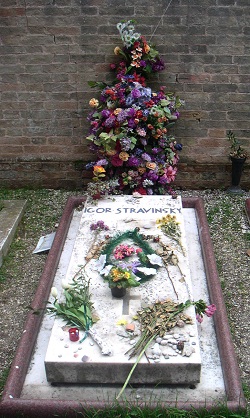How are you?
This week's lecture is “Igor
Stravinsky”, the 23rd topic of “Classical Music”, which is a summary of the contents of “108.
Classical Music: 23. Igor Stravinsky” introduced on October
28th, 2017.
Igor Stravinsky was a
Russian composer, pianist and conductor born on June 17, 1882 and died on April
6, 1971.
 |
| Igor Stravinsky (1903) |
Stravinsky first gained
international fame with three ballets, “The Firebird”, “Petrushka” and “The
Rite of Spring”, commissioned by Sergei Diaghilev, founder of the Ballets
Russes, and premiered in Paris by Ballets Russes.
 |
| Sergei Diaghilev by Léon Bakst (1906) |
In particular, The Rite
of Spring has contributed greatly to Stravinsky's lasting reputation as one of
the revolutionary works that have broken static music boundaries and many
composers have since arranged for their tastes.
 |
| Group of supporters and members of the Ballets Russes (1911) |
The earliest period in
the evolution of Stravinsky's musical style is the ‘Russian period (c.
1907–1919)’, the period began with works created under the tutelage of Nikolai
Rimsky-Korsakov from 1905 to the death of Rimsky-Korsakov in 1908.
 |
| Stravinsky and Rimsky-Korsakov seated together on the left (1908) |
The ‘Neoclassical
period (c. 1920–1954)' is a period in which Stravinsky not only returned to the
music of the Classical period, but also explored the themes from the ancient
Classical world, such as Greek mythology.
 |
| Igor Stravinsky by Pablo Picasso (1920) |
In the 1950s,
Stravinsky was making a transition to the ‘Serial period (1954-1968)', where he
began to use serial compositional techniques such as dodecaphony, the twelve-tone
technique originally devised by Schoenberg.
 |
| Stravinsky conducting (1965) |
Stravinsky is widely
considered one of the most important and influential composers of the 20th
century and a pivotal figure in modernist music.
 |
| Stravinsky's grave on San Michele Island |
Thank you.













